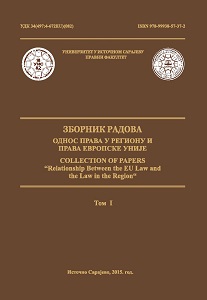Босанскохерцеговачка држава и друштво и евентуалне уставне промјене у контексту европских интеграција
The Bosnian-Herzegovinian State and Society and Possible Constitutional Changes in the Context of European Integration
Author(s): Mile Dmičić
Subject(s): Law, Constitution, Jurisprudence, Constitutional Law, EU-Legislation
Published by: Правни факултет Универзитета у Источном Сарајеву
Keywords: Dayton Peace Agreement; Constitution; Constitutional reform; European integration; State; Entities; Communitarian and national law;
Summary/Abstract: Bosnia and Herzegovina is, in many aspects, a specific and complex state.Specifically, it consists of two entities: the Republic of Srpska and the Federation of Bosnia and Herzegovina as well as of Brčko District, which by its legal nature, has the characteristics of a third entity of Bosnia and Herzegovina.Its Constitution is both, an act of international and national law and apart of the international peace agreement.It is essential to maintain and preserve the established constitutional status, territorial integrity and equality entity, which assumes the necessary consent, confidence and equality of the constituent peoples, citizens and others.Previously established objectives, content and scope of possible constitutional changes include the preservation of the Dayton arrangements and providing of full consensus between the two entities and three equal constituent peoples, as well as the participation of States Parties and the guarantors of the peace agreement, all with respect to the process and procedures of constitutional changes.The existing state and social organization is not an obstacle to its accession to the European Union and as such, based on the Dayton arrangements, in accordance with the principle of pactasundservanda, must be preserved.European integration, democratic development and reform process imply that, in addition to issues concerning the transfer of competences to the European Union institutions and defining the relationship between the national and communitarian law, constitutional changes may include aconstitutional matter, which will regulate the relationship between different levels of government in regarding the European affairs and provide appropriate representation between the two entities and the protection of their interests and the interests of the three constituent peoples.Thus, the aim of this paper is primarily to contribute to answering the question about the need for constitutional reforms in the context of transition and European integration and to identify the appropriate time, nature and extent of these changes.
- Page Range: 297-313
- Page Count: 17
- Publication Year: 2015
- Language: Serbian
- Content File-PDF

